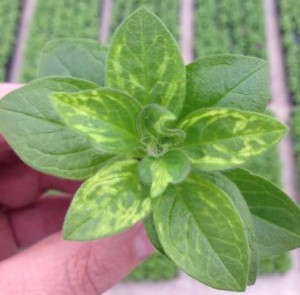Exclusive: Kansas Department Of Agriculture’s Jeff Vogel Discusses TMV And The Kansas Pest Freedom Standards
 Greenhouse Grower talked to the Kansas Department of Agriculture’s Plant Protection and Weed Control Program Manager Jeff Vogel to learn about the Kansas Pest Freedom Standards and how the state is regulating tobacco mosaic virus (TMV) on petunias this season.
Greenhouse Grower talked to the Kansas Department of Agriculture’s Plant Protection and Weed Control Program Manager Jeff Vogel to learn about the Kansas Pest Freedom Standards and how the state is regulating tobacco mosaic virus (TMV) on petunias this season.
Greenhouse Grower (GG): Please describe the Kansas Pest Freedom Standard and where the presence of tobacco mosaic virus (TMV) is included within that.
Jeff Vogel: The Kansas Pest Freedom Standard is a list of regulated non-quarantine pests that apply to live plants that live plant dealers may possess, sell, grow, etc. Within that, we list several different categories of pests, including insects and diseases, and viruses. We have zero tolerance for viruses in Kansas. A while back, the change was made so we would regulate not only perennial nursery type plants – woodies – but also all live plants, including bedding and annuals. The idea behind that was to clean up some of the disease and pest issues in the greenhouse. This has been in place for a number of years now. So we inspect and certify and regulate annuals and bedding plants the same as we would perennials or herbaceous perennials or woody plants.
Tobacco mosaic virus (TMV) falls in that category of viruses. TMV presents a big concern for us because of the fact that it can be transmitted through physical contact – sap – and it’s not an insect vectored disease, where we could control the insect. For example, INSV would be thrip-vectored, so if we could control the thrips, we would be able to control the spread of that disease. In this case, it was a big concern because of the host range and then also the fact that it could be easily transferred through planting plants or transplanting plants and could become a much larger issue as the season went on. So we were trying to get on top of the issue before it became larger and growers were closer to the actual retail selling season.
From communication with the Dümmen Group and [broker] Ball Seed, who’s been working with us, too, it’s unclear how many varieties were infected. When it started off with one or two varieties and then all of the sudden it was 30 different varieties or more – I don’t know how many were infected – but it got exponentially bigger very quickly. That was another reason to be proactive. I wouldn’t call this an emergency situation but sometimes when we’re dealing with a plant pest, you don’t have all the information you’d like to. In this case, I don’t know if we have a handle on exactly how many varieties were infected, but we’re getting a better picture now. That’s why we moved very quickly on our response.
GG: Does Kansas inspect every grower operation?
Vogel: In Kansas, there are two different types of inspections. One is a verification inspection, which is a non-requested inspection. We randomly pick growers to inspect and to verify that they are in compliance with state regulations. These verification inspections can be targeted based on a random list, or trace-forward, trace-back on an already known pest issue. So if we have a pest issue, we know the source, we know plant dealers who named them as a source, and we’ll make sure we get this pest issue cleaned up.
Then we also have our export inspections, which are requested inspections from growers that need certification to ship plants out of state. So depending on the situation, we don’t inspect every grower. We inspect every grower that ships out of state or they may be part of that random verification inspection protocol.
GG: What is the protocol for testing plants for the presence of TMV and determining whether or not they should be destroyed?
Vogel: In this case, if we come across a lot of petunias that test positive for TMV, we will issue a regulatory action ordering those plants to be destroyed.
If we go into a facility and test a petunia that’s known to be positive, we’ve had a positive test in the state before and the facility has bought cuttings sourced from Dümmen El Salvador or Welby Gardens or Timbuk II, that’s really specific. If plants test negative through the test strips, we’ll place the grower under compliance agreement to follow the specific list of best management practices that prevent the spread and transmission of it into other hosts, up until only about a month. After a month, the symptoms should have presented themselves and after a month, if the symptoms aren’t there, the plants should be clean.
If we test something and it’s positive, it’s rejected. It needs to be destroyed at that point. But if it’s a known positive plant – we’ve had another positive at another grower in the state – there are two options. The grower can either sign a compliance agreement with us to follow BMPs to prevent the spread, or if they refuse to do that, the plants can be destroyed, because it has to be managed and they have to manage it in a certain way to prevent the spread of it.
There aren’t very many, but in the situations where this has come up, growers have signed compliance agreements with us, and they’re very short. It’s only a month where they have to use gloves, handle them separately, those kinds of things. We’re concerned, even with a negative test. Maybe the symptoms haven’t shown themselves yet – and then maybe later on, we’ll come back and all of the sudden there’s a handful of plants that have shown symptoms and it might be positive at that point. Then we’ll follow through with the normal enforcement procedure. But we have given them the option of the compliance agreement.
On the retail side, it’s less controlled. If we find positive plants there, those will be rejected and destroyed. For Kansas, and across the country, that’s not an unusual thing.
GG: Will Kansas agricultural inspectors be in retailer operations this spring?
Vogel: Yes, that’s very typical, though. We will typically be in retailer operations doing these random inspections or trace-forward, trace-back in the spring time anyway. Hosta virus x was a big issue a couple of years ago and we were in retailers quite a bit at that point. It’s prime season to be out there, doing verification.
GG: Will the state provide any assistance to growers or retailers affected by this?
Vogel: No. Our actions are very typical and our relations working with the growers are very typical of any other pest problems that would pop up. We’ve been working closely with the broker and we’ve talked to Dümmen, too, and they realize that this is an issue and are trying to make things right by offering credits to growers.
We’re trying to get this taken care of before a bunch of hanging baskets are grown out and the value of those are more than a flat of rooted cuttings that just came in. We want to do this while being very proactive here and trying to communicate this issue to the growers.
I’m talking with counterparts in other states as we move forward, but bedding and annual plants are looked at differently in other states. Some states care about it and some states don’t. If we have TMV-infected petunias coming into Kansas on the retail side when we get closer to spring and early summer, that’s our big concern because maybe the out-of-state sources who grew those perhaps weren’t required to manage it. We have to realize, too, that people don’t want to sell diseased plants, but at the same time it’s a concern for us because there could be a second issue that pops up on the retail side as we go later in the spring.
GG: Will other states that you’re working with take similar actions?
Vogel: It depends. From my understanding, Colorado does, and it certified Welby Gardens in that state; whereas in Ohio (where Timbuk II is located), does not inspect and certify. So that goes back to us working with growers in other states to understand our requirements here in Kansas that all plants need to have certification and they need to be pest free, with some tolerances under the pest freedom standard. Because our pest freedom standards, viruses are zero tolerance but other types of diseases, there are some tolerances in there, depending on the category of the plant. We’re just trying to be proactive about our approach to this so the situation doesn’t get larger as we go forward.
In Ohio and other states, things are looked at differently than they are in Kansas, and that’s something that I’m looking at trying to address with our Central Plant Board, a group of my counterparts in other states who meet yearly. I’ll give a presentation on what we experienced here and how we handled things and why it’s important to understand how each state handles live plants. It’s been a learning experience. The state summary of regulations on the National Plant Board website lists different state requirements, and we try to spell out that all live plants, if they are being shipped in for sale and distribution, need to be inspected and certified.
GG: How big is the floriculture industry in Kansas?
Vogel: As far as live plant verifications we issued for export, those are generally between 50 and 60 a year. But we issue 1,700 to 1,800 live plant dealer licenses, and those include growers, retailers and landscapers. We have a business license and on top of that, people who export plants will receive a live plant certificate so they can export plants to other states if they meet requirements.
Read the KDA’s best management practices. For more information or if you require assistance from KDA on this matter, call 785-862-2180 or eMail [email protected].










